Aspects of this interview have been edited to protect the the sanity of our readers
The times we live in are dark and chaotic, filled with fear, misinformation, and an untrustworthy government. Some games are at their best when they help players escape the darkness of real life, allowing them to take on the role of a mighty adventurer or space explorer saving the world and looking good doing it. One game, however, revels in the yawning empty void of existence and thrills in the capricious nature of the universe: Delta Green. With roots going back to the 90’s, the 2015 relaunch of the game by Arc Dream Publishing has become incredibly popular, and a standout example of Lovecraftian roleplaying in the current tabletop revolution. Unlike the pulpy fun of Call of Cthulhu, the game from which it spun off, Delta Green is all about the unknowable horror of the Cthulhu mythos and the bleak pointlessness of opposing eldritch entities. When you play Delta Green, you either go insane or you die. No exceptions.
Naturally, I’m a huge fan.
A while back, I was able to catch up with the men who created Arc Dream and helped resurrect Delta Green: Dennis Detwiller and Shane Ivey, both of whom have been working in tabletop games longer than I’ve been alive. We discussed the origins of Delta Green, some of the recent releases by Arc Dream, and Lovecraft in the 21st century.
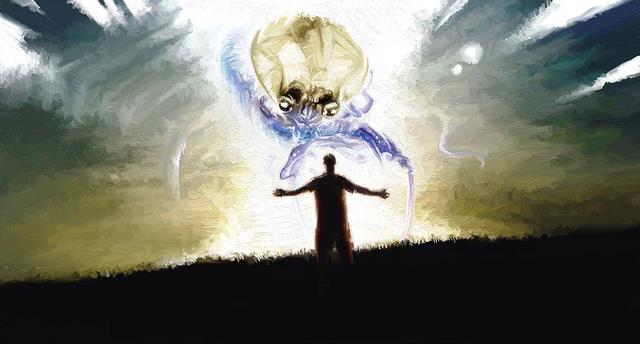
Dan Arndt: So what is the origin of Delta Green? How did it separate from Call of Cthulhu
Dennis Detwiller: So in the early nineties, John Tynes (founder of Pagan Publishing) wrote a scenario for the Official Call of Cthulhu Magazine called the unspeakable oath. He was running it, I think it was 1992 I read it and it was 93 it was published. So we predated The X-Files, which is nice. But he basically invented Delta Green as a way to run his groups in the modern day. That made sense because we were constantly dying and recruiting like waiters and stuff. Like “Come on waiter, let’s go fight the cult cause my other guy died” . And it didn’t make any sense why the teams would stay together when, you know, six of them died. I’m going to go get my uncles and we’re going to go kill. That was the game that’s basically Call of Cthulhu before John stepped in and said, “Well what if there was a shadowy government agency that just sent more bodies in to burn on fire. And we thought that was really clever. And then shortly thereafter, Adam Scott Glancy wrote a big giant timeline, dumped it on Tynes and said: “this would be a cool Delta Green timeline. And Tynes immediately said, “Well, I don’t know anything about that. So that’s probably a great you should do that. And maybe we should write a book or something.”
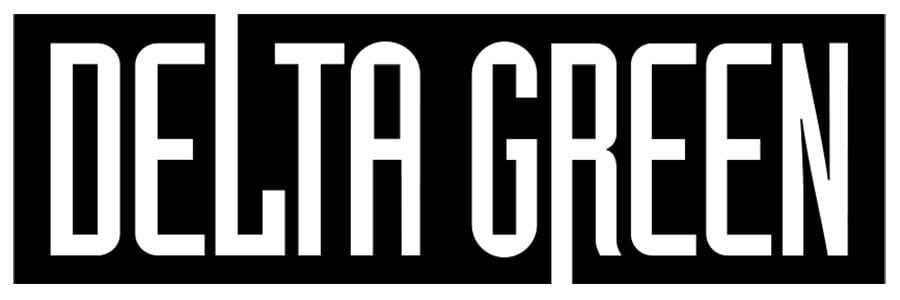
We wrote the initial Delta Green. It took three or four years and then Countdown took a couple more. But yes, it began in Call of Cthulhu. But it very quickly kind of became its own thing, just because the 1920s have a very specific feel, and the modern day Cthulhu Now never really took off because now that kind of stuff was just kind of…
Shane Ivey: They first started exploring that in the late eighties, early nineties. Yeah. And then before you know it, so when Delta Green first hit in the late nineties, 96/ 97 it sort of shocked everybody because everybody that looked at it was like, oh, this is what Cthulhu Now now should have been.
DD: I mean, it’s tough. Like Lynn Willis, president of Chaosium (EN: Publisher of Call of Cthulhu) at the time was very focused on the 1920s and we just kind of came to a conclusion where he was like, you guys do the modern stuff, we’ll do the 20s. And that’s kind of where we are. And it was a nice copacetic relationship there. And you know, when we moved systems, when we kind of became our own thing, it’s, you know, Chaosium’s great. We get along with them great. it’s just, we wanted to build a different game rule set wise, so Shane’s bond rule and the combat rules, especially, we felt Call of Cthulhu just didn’t cut it anymore. And we like in Delta Green, for those who don’t know, you have a personal bond system where I have a wife or a child and every degenerative horrible thing that happens to me, I can either take it out on them and ruin my relationship in order to preserve my sanity or I could suffer in silence and eventually crack
either way. So we want to build that in. And then combat, I got sick of rolling 24d6 for a machine gun. It had to be fast and scary and I wanted, I came in demanding that a pistol comes out in a
meeting with three people, that’s got to be the most awfully terrifying thing your Delta Green agent would do. Because you know, you only do one roll and you’re just dead. That’s it. The initial reactions to it were like, how’s this is never going to work. How is this? And it just kind of works. So yeah, really excited about that. And that’s kind of why we separated away from Call of Cthulhu.
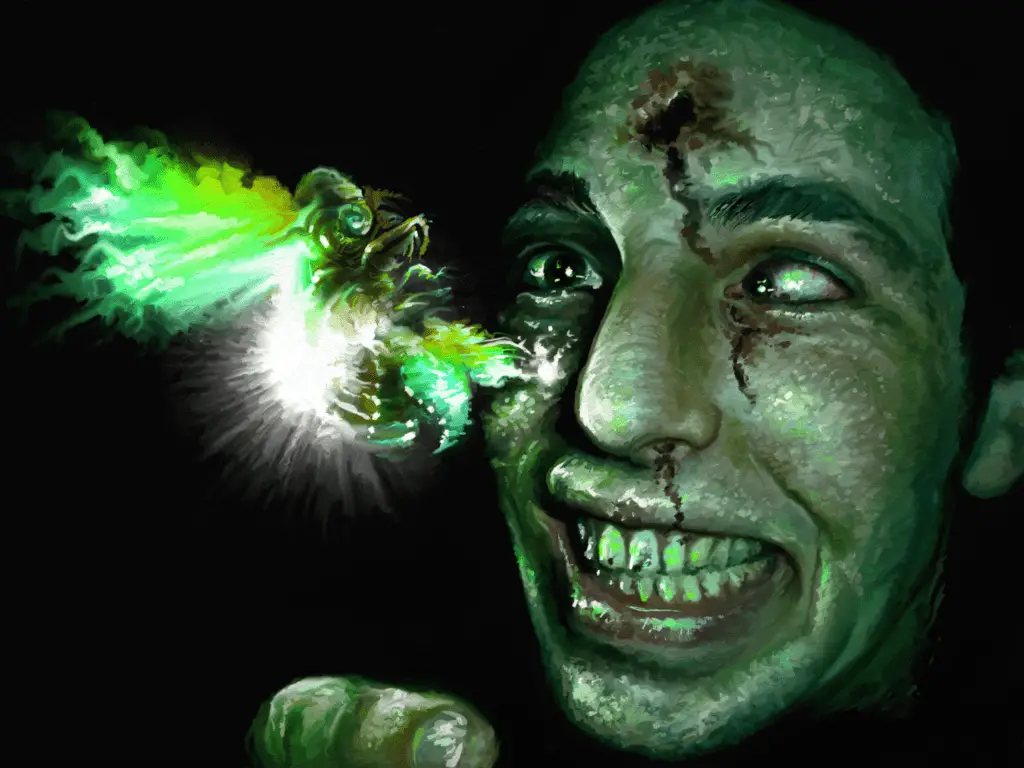
SI: Yeah. I mean we spent, you know, from 1993 to 2012, when we first really got started in 2011, we really started working on Delta Green as its own game. You know, almost 20 years. Over the course of that time Delta Green had evolved in a really particular direction. It had its own sensibility. And these days if you compare Call of Cthulhu to Delta Green, they’re really different
games. They’re really different experiences at the table. And you can have a blast playing Call of Cthulhu, obviously it’s a fun game. But they sort of went in
one direction, and we wanted Delta Green to go in another, more disturbing direction.
DD: Yeah. We’re about nihilistic horror, like to the penultimate degree. And we try and take it as far as we possibly can, which is there is no hope. Humanity will never save itself. The best you can do is a holding action. And even then…you’re just going to burn. And people seem to love that. It seems counterintuitive, but you know, factually it just seems to happen. So we’re very lucky that people kind of glommed onto that idea.
SI: It’s not like we had to invent the concept of a tragedy, you know, as a successful form of fiction. It’s just very rarely done in playing games.
DA: You really wouldn’t expect people to want to roleplay a sad story but, they do.
DD: It’s bizarre. Like it might be just because we’re offset from standard gaming. D&D is all about endless collection and winning. The worst thing that happens is that I lose my weapon and I have to get it back from the Orc King. It’s not like I’m going to be slaughtered in my sleep, and even if you do die, you can come back. We might just be benefiting from being the opposite of that. It’s very shocking for D&D people. it’s about 50/50, the conversion rate. If they come and do a Delta Green game knowing nothing and they play D&D, they either go, “Oh!”, or they go like, “I hated that, that’s awful.” So you know, that’s not a bad conversion rate.
SI: Delta Green fans tend to be passionate, I don’t run into very many people that are sort of on the fence. I know plenty of people that just, it’s not their thing and that’s cool. And then the rest of the people that I know, once they are exposed to it, if they like it, they tend to really freaking like it, which is how I caught on board.
DD: Yeah, that’s true. But the the really interesting conception on Delta Green is that basically if you took a Lovecraft tale like “In The Mountains of Madness” and brought it to the
modern day, it would be Delta Green. It’s a cutting edge techno thriller with horror. Lovecraft sort of deep dive into these scientific procedures. He was
flying tri planes with portable radio.
SI: Five pages on this drill bit that had been in.
DD: So it’s like if you wrote that today, it would just be a Delta Green operation. A lot of
people go like, well, you know, you have a cell phone, it’s going to ruin the horror. But if Lovecraft was writing shit today, they would have cell phones. And he’d be fine with that. All you have to do is make communication itself another source of horror.
SI: Yeah. We’re scared of cell phones today already, you don’t need to add monstrosity to technology to make it scary.
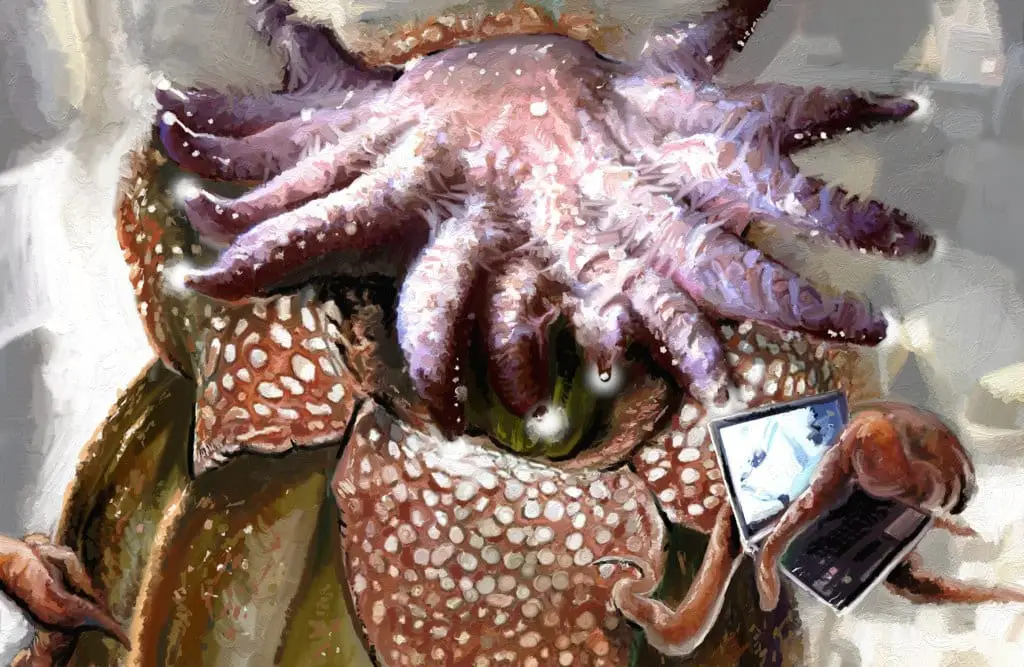
DA: I love that because it’s so authentic to his tone. Like Lovecraft was very much about “No you can’t do anything there’s no hope, the universe is a blind and awful place. But it’s also nice to separate from him a little bit because he’s a little controversial nowadays.
SI: Unless you were his friend, then he was a great friend! If you happen to not be in his close circle of friends and of the wrong color of religion then, no.
DD: Well, yeah, I think what’s fundamentally funny about Lovecraft is, you know, he’s an awful racist, but he’s also undermining his entire concept of supremacy by saying nothing matters, that ll of humanity will destroy itself. You know, he does the white man’s savior moment in one paragraph and the next paragraph he’s like “antediluvian powers are going to consume everything
and science means nothing and western culture will never survive”. He was just so messed up. And, and the nugget of his concept of horror. It was already introduced, Poe was getting into that. He clamped onto it and what he did is he put it into and he confronted human science with it. That’s kind of the big difference.
DA: That’s also why I love the modern setting because you can have all of these queer characters or characters of color and it would just piss him off. Plus it doesn’t have to be as much of an impediment as it would be in the 1920’s setting.
SI: Well, I mean and that’s been, I mean that’s its own sort of, that could be a whole thing. Our friend
Chris Spivey won many awards last year for Harlem Unbound, where he wanted to sort of dive into Lovecraft and horror gaming from the perspective of a person of color and from the perspective of people of color in the 1920s. Playing that horror within the additional larger horror, you know, of being an American in New York who was not white In the 1920s, you know, which is its own complete horror show. But that means it has its own unique stories of courage and heroism against insurmountable odds.
DA: So what can you tell me about The Complex. When I got it, it sort of blew me away in that it was in many ways just facts about government agencies. Where did it come from?
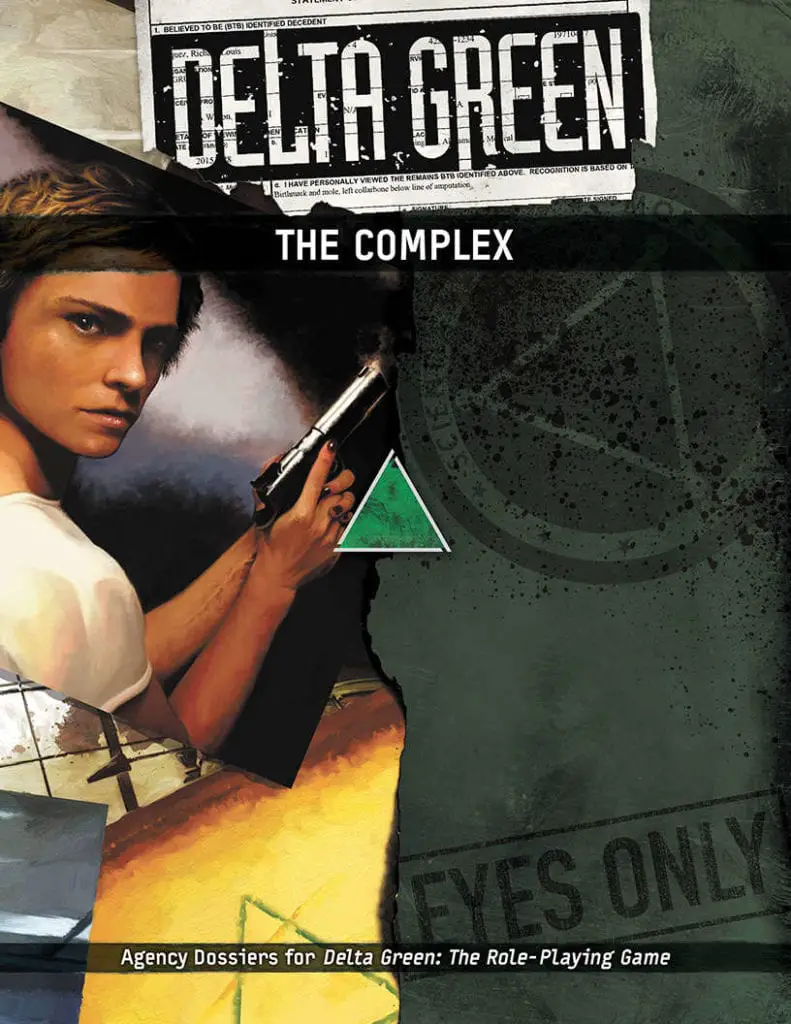
SI: Well, the Agent’s Handbook, which is sort of the main players book for Delta Green has about, I
don’t know, a quarter or a third of the book describing various federal government
agencies that are likely to show up in campaigns. The primary author on those, Christopher Gunning wrote those with an eye toward utility in play. In other words, presenting information that would be useful at the table if the game master wanted to get into some details of life on the ground, you know, with this agency or that, and would be useful for the players.
DD: If you have a player who is really into it and wants to do the homework, and learn all that stuff. But there’s only so much space. The original Delta
Green book Countdown had dossiers but they were just one page each.
SI: Yeah, they were very cursory and that made them not all that useful at the table. They didn’t really say anything interesting, anything about what it’s like to work with that agency or interact with it or how it relates to other government agencies. So that’s why we made them a little deeper, but that means that that put a pretty hard limit on how many we were going to put in the
Agent’s Handbook. So we had a lot of other agencies that we wanted to cover, give us some of our treatment too. So we made those stretch goals in the Kickstarter campaign, and originally we had set it up so that it was going to be like it was four separate stretch goals and each was going to cover three or four new agencies and along certain themes. And I went, you know, we kind of went back and forth and decided let’s, you know, it was just beautiful to get them all done, let’s just bring them together as a publication. It wound up being more substantial than we planned on anyway. And so that’s why it’s its own thing.

DD: Well, I mean, everything Delta Green agents do is unofficial, off the clock. So an agent could be literally just about anything. If you have a day job, you know, as long as they can pretend
somewhat convincingly that they have some pretext for doing what they’re doing, then it doesn’t really matter where they come from. And yeah, you can ask Al Capone, you can get all kinds of intel and say, well, somebody stabs us.
DA: And it has that, it’s for everyone. You just have some piece of utility for other sort of more modern games as well. If we’re thinking about agencies and things.
SI: I mean what I really had fun with working with Chris on when we were putting the agencies chapters together for the Agent’s Handbook and then for The Complex as well was building not just as kind of Wikipedia entries, but drawing in kind of [telling a story]. Yeah. And drawing any kind of insight or perspective on how these agencies relate to each other, what their reputations
are with each other. You know, if you work for the National Park Service, right, here’s how everybody looks at you. Here’s how, you know things like that, which is, I don’t think
anybody’s done anything like that in games before. You know, any modern day stuff in RPGs are kind of a niche because it’s not D&D, but even so, there’ve been plenty of modern
games. I don’t think anybody’s done anything like this before. So I think we built it to be really useful at the table and again, to reward players who are into it so hard that they want more and
more and more of that depth without actually going to the trouble of the befriending their own FBI agents to learn about all of that.
DA: And then Control Group is kind of the first big campaign, as compared to Night At The Opera’s collection of standalone operations, right?
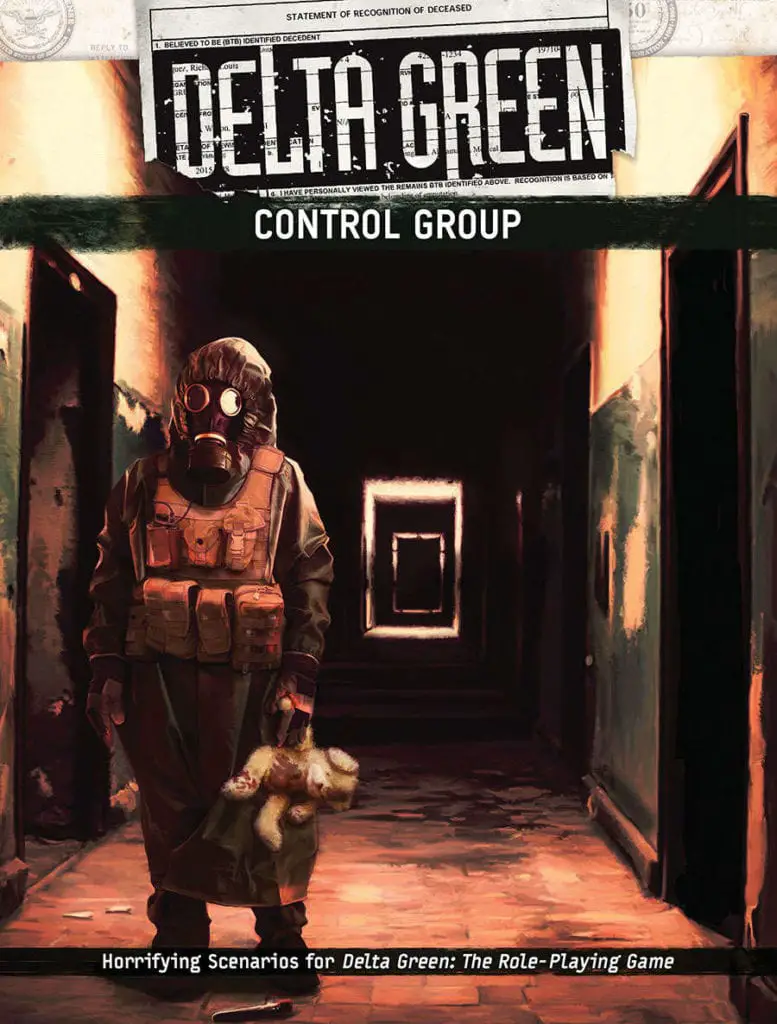
SI: Yeah, Night At The Opera we collected scenarios that had been published
individually. We’ve published a number of them and there was tons of interest. Just as standalone, we get a 20 page PDF or paper back, right? So with Night At The Opera, we just
collected six of our favorites of those and put them in a single hardback volume, so you can just buy them all at once and it’s less expensive than buying six of them in paperback.
Control Group was built to be sort of an introductory campaign, in the sense of it’ll let new players come in and play characters that have nothing to do with Delta Green that get exposed to it. You have one group of characters in this first scenario that’s set in a little space like a NASA mission that goes horribly wrong. And then you have another group that’s in the army in Afghanistan into the group clubs, the guy that’s in a CDC team, you know, working in the U.S. So if you have survivors from those, right then in theory, you could kind of bring the survivors together for the fourth adventure in the book, which is sort of double sized.
DD: Yeah, it’s an actual Delta green operation. So at that point you can sort of establish, okay, so you who are the sole survivor of this NASA mission, right. When you
were approached, say, you know, they said, okay, we know and have a sense of what you’ve seen up there, would you like to save somebody else from suffering that later? Right. So you kind of
repeat that process so you can wind up with in “Wormwood Arena,” which is this big kind of sprawling campaign adventure,this investigation of this cult. Then can have them come together or that’d be the first sort of “real” Delta Green mission that brings. So that was the theory behind it.
You can learn more about Delta Green on its website. You also pick up the books discussed in this interview as well as many others, as well as the full range of Arc Dream publications, on their shop and at Drive Thru RPG.
Also! We’re currently running a giveaway with Arc Dream for both the Agent’s Handbook and the Quarantine Bundle, basically everything you need to get Delta Green up and running. Check it out!
Images via Arc Dream Publishing

